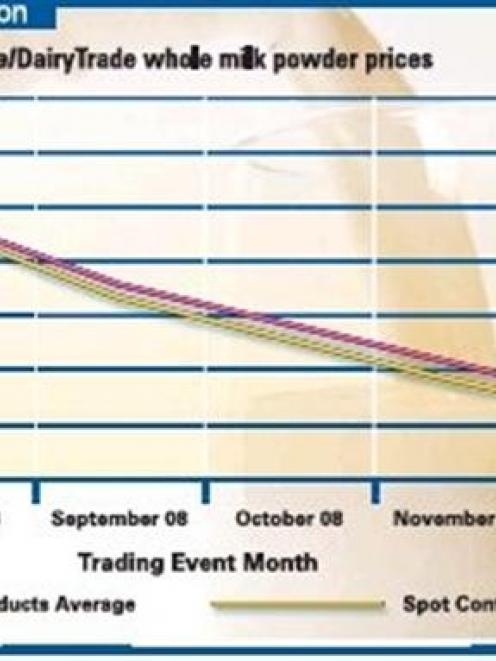
Fonterra's global Internet auction system is being blamed for accentuating the decline in dairy prices, with claims it has cost farmers $2 billion in lost income.
Critics say the auction, launched in July, has aided a rapid fall in global prices by allowing buyers not to commit on a falling market.
They argue it has turned Fonterra, which was formed on the promise of being a price maker, into being a price breaker.
But the dairy giant rejects this, saying commodity markets are falling and they are considering adding skim milk powder to the range of products traded.
Auction prices fell 14% in the last sale on December 3 compared with November.
Since its July launch, prices have fallen from close to $US4500 ($NZ8460) a tonne to just over $US2000.
Sources say a $US400 a tonne reduction in auction prices equates to a 60c/kg of milk solids drop in the payout.
The opening price of each auction has been 15% below the closing price of the previous auction, but with prices already at $US2000 a tonne the fear is that prices would be driven even lower.
Competing dairy companies have been reluctant to air their concerns publicly given they account for just 3% of New Zealand's milk collection, and Fonterra's size means it establishes the benchmark for both the price paid to farmers and market returns.
While whole milk powder prices have come under pressure, the value of other dairy products, cheese and caseinates - which Fonterra produces but competitors do not - have not fallen.
It has been claimed that Fonterra has been able to benefit from its greater product mix.
Dairy Australia, Westland Milk Products, New Zealand Dairies and independent exporter Global Dairy Network have all aired their concerns about the impact of the auction system on global prices, but were reluctant to comment further when approached.
New Zealand Dairies chief executive Aidan Johnstone said this week whole milk prices were at levels last seen in 2003-04.
"While it was inevitable that prices would fall from record levels seen earlier this year, we believe this decline has been accelerated by the new global dairy trade auction system introduced by Fonterra."
Westland chairman Ross Scarlett said the process gave buyers more control over the prices they paid.
"We don't think Fonterra's policy has been helpful in a declining market," he said earlier this week.
Dairy Australia attributed some of the falling incomes of its members to the role of the auction system in easing international prices.
Critics suggest Fonterra is using the auction system to enhance its position with New Zealand dairy farmers by strengthening its dominance over the growing number of competing dairy companies and to compensate for the poor performance of its added-value business.
In Fonterra's latest payout forecast for this season of $6 a kg of milk solids (kg ms), the contribution from its added value activities was just 40c/kg ms, a modest increase of 5c/kg ms on earlier forecasts.
The view was that Fonterra was trying to retain the confidence and goodwill of its suppliers and it was doing that through its payout.
Last season it paid its 11,500 suppliers $7.90/kg ms but was beaten by Westland at$8.29/kg ms and Tatua Co-operative Dairy Company, which paid its 112 suppliers $8/kg ms.
Global Dairy Network director and former Fonterra executive John Shaskey said the auction put at risk many of the planks which had made the dairy industry successful.
Those structures of customer focus, relationships and continuity of supply were built up by the old Dairy Board in co-operation with dairy companies, but were not possible when selling by auction.
Mr Shaskey said he was not being a doom merchant, but he believed the auction platform was fundamentally wrong.
"It says that there is no management capability to manage commodity pricing and mitigate the volatility in the market through the right customer and market choices."
The timing of the auction's launch was unfortunate, he said, coinciding with the start of falling global prices.
Mr Shaskey said auctions worked well when product was short, such as a seller's market, but worked against suppliers in a weak market.
Equally, he feared the auction could threaten Fonterra's global strategy of sourcing milk from other countries which it then marketed.
He said if Fonterra could not add value for non-New Zealand milk, then companies may not join its structure.
But, Fonterra rejected those claims, saying the market was the market.
Its commercial director of GDT, Guy Roper, said the auction provided transparency and showed where the market was headed while also allowing customers choice and the option to commit forward while providing Fonterra with certainty for planning and locked in forward orders.
Critics were ignoring the fact all commodities were falling in price. Wheat, barley, maize and soybean meal had fallen between 44% and 55% since their mid-year peaks.
Mr Roper said in an interview that prices of other milk products were also falling as the market found a level given an imbalance between supply and demand.
This week's auction had given Fonterra an insight to where the market was headed.
Mr Roper said there was a range in price of $US400 a tonne, with the higher price a premium paid by a customer for powder supplied in August.
"It is saying some customers are prepared to pay a premium for whole milk powder. It gives them certainty for product for August delivery."
The auction
• The globalDairyTrade (GDT) is a monthly Internet-based global selling system used by Fonterra for whole milk powder.
• Fonterra sells about 10% of its whole milk powder production, about 20,0000 tonnes, through GDT.
• The goal is to provide more transparent pricing for milk products and to establish what is happening with the market.
• In five months, GDT prices have declined 50%.
Average price per sale:
July $US4377 a tonne.
August $US3705 a tonne.
September $US3306.
October $US2917.
November $US2223.
• Fonterra says the trend mirrored declining prices for other commodities




